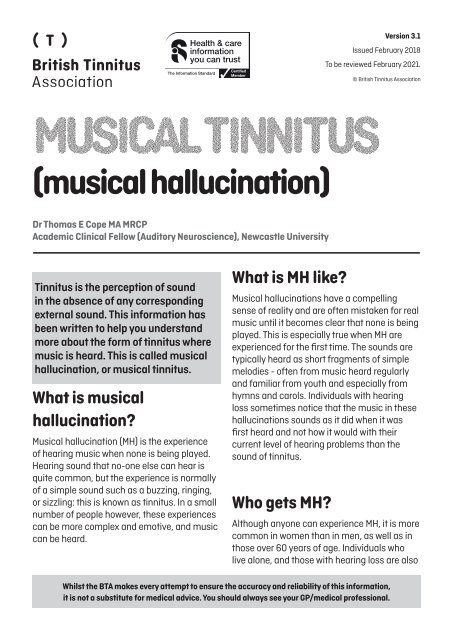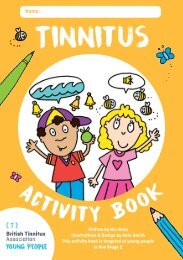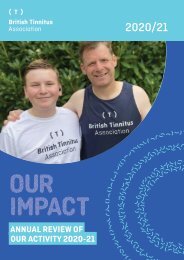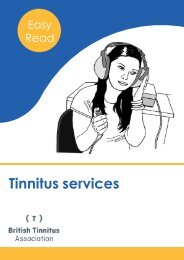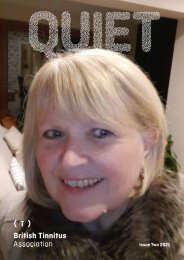Musical hallucination Ver 3.1
Create successful ePaper yourself
Turn your PDF publications into a flip-book with our unique Google optimized e-Paper software.
<strong>Ver</strong>sion <strong>3.1</strong><br />
Issued February 2018<br />
To be reviewed February 2021.<br />
© British Tinnitus Association<br />
MUSICAL TINNITUS<br />
(musical <strong>hallucination</strong>)<br />
Dr Thomas E Cope MA MRCP<br />
Academic Clinical Fellow (Auditory Neuroscience), Newcastle University<br />
Tinnitus is the perception of sound<br />
in the absence of any corresponding<br />
external sound. This information has<br />
been written to help you understand<br />
more about the form of tinnitus where<br />
music is heard. This is called musical<br />
<strong>hallucination</strong>, or musical tinnitus.<br />
What is musical<br />
<strong>hallucination</strong>?<br />
<strong>Musical</strong> <strong>hallucination</strong> (MH) is the experience<br />
of hearing music when none is being played.<br />
Hearing sound that no-one else can hear is<br />
quite common, but the experience is normally<br />
of a simple sound such as a buzzing, ringing,<br />
or sizzling: this is known as tinnitus. In a small<br />
number of people however, these experiences<br />
can be more complex and emotive, and music<br />
can be heard.<br />
What is MH like?<br />
<strong>Musical</strong> <strong>hallucination</strong>s have a compelling<br />
sense of reality and are often mistaken for real<br />
music until it becomes clear that none is being<br />
played. This is especially true when MH are<br />
experienced for the first time. The sounds are<br />
typically heard as short fragments of simple<br />
melodies - often from music heard regularly<br />
and familiar from youth and especially from<br />
hymns and carols. Individuals with hearing<br />
loss sometimes notice that the music in these<br />
<strong>hallucination</strong>s sounds as it did when it was<br />
first heard and not how it would with their<br />
current level of hearing problems than the<br />
sound of tinnitus.<br />
Who gets MH?<br />
Although anyone can experience MH, it is more<br />
common in women than in men, as well as in<br />
those over 60 years of age. Individuals who<br />
live alone, and those with hearing loss are also<br />
Whilst the BTA makes every attempt to ensure the accuracy and reliability of this information,<br />
it is not a substitute for medical advice. You should always see your GP/medical professional.
more likely to experience MH.<br />
What causes MH?<br />
In most individuals with MH there is no<br />
underlying cause found.<br />
<strong>Ver</strong>y rarely, MH can be caused by serious<br />
conditions, for example by problems with the<br />
blood vessels in the brain or by brain tumours.<br />
In these conditions there are likely to be other<br />
symptoms, but your doctor might choose to<br />
perform some investigations to rule them out.<br />
MH is also more common in individuals who<br />
have epilepsy or Alzheimer’s disease. It is<br />
therefore very important to mention to your<br />
doctor if you have MH and experience changes<br />
in your vision, dizziness, severe headaches,<br />
problems with your speech or difficulties with<br />
movements.<br />
Is it caused by my<br />
medications?<br />
Like tinnitus, quite a number of medications<br />
have been accused of causing or contributing<br />
to MH. These associations are not thought<br />
to be strong, and in most individuals who<br />
experience MH they are not due to medication.<br />
The only exception to this are medications<br />
based on opium, such as tramadol, morphine<br />
sulphate and oxycodone, which have been<br />
shown to cause MH in rare cases.<br />
If you believe that your MH might be caused<br />
by one of these or another medication, it is<br />
important that you do not stop taking it or<br />
adjust the dosage without first discussing this<br />
with your general practitioner or the doctor<br />
who prescribed the medication.<br />
Is MH a psychiatric<br />
problem?<br />
Some people with MH are worried that it might<br />
represent a mental health condition, such as<br />
schizophrenia. Although in schizophrenia it is<br />
common to hear voices, it is in fact very rare<br />
to experience MH and there is thought to be no<br />
connection between the two conditions.<br />
The majority of individuals with MH do not<br />
have any psychiatric disturbance, although<br />
MH is quite common in individuals who have<br />
a condition known as obsessive compulsive<br />
disorder (OCD), in which they experience<br />
repetitive, intrusive and distressing thoughts<br />
and feel strong urges to repeatedly perform<br />
actions such as hand washing.<br />
Although it is estimated that around 4 in 10<br />
individuals with OCD will experience MH at<br />
some time in their life, it is a rare condition<br />
and it is important to note that the majority of<br />
individuals with MH do not have OCD.<br />
Can MH be treated?<br />
If MH has an underlying cause, addressing<br />
the cause can often also relieve MH. The most<br />
common and easily treatable cause is hearing<br />
loss, so your doctor is likely to request that you<br />
undergo some tests of your hearing and, based<br />
on the results of this, may prescribe a hearing<br />
aid.<br />
Many people find that MH becomes less<br />
intrusive once the condition has been<br />
explained to them and they have been<br />
reassured that there is no serious underlying<br />
cause. If MH continues to be troublesome<br />
Whilst the BTA makes every attempt to ensure the accuracy and reliability of this information,<br />
it is not a substitute for medical advice. You should always see your GP/medical professional.
despite this, it can be managed with the<br />
techniques used to treat other forms of<br />
tinnitus. It might be appropriate to use<br />
medication to treat the underlying condition<br />
contributing to the MH and your doctor will be<br />
happy to discuss this with you.<br />
References<br />
Berrios GE. <strong>Musical</strong> <strong>hallucination</strong>s. A historical<br />
and clinical study, British Journal of Psychiatry,<br />
1990. 156, pp188–194 PMID: 2180526<br />
Cope TE and Baguley DM. Is <strong>Musical</strong><br />
Hallucination an Otological Phenomenon?<br />
A Review of the Literature, Clinical<br />
Otolaryngology, 2009. 34(5), pp423-430<br />
PMID: 19793274<br />
Evers S and Ellger T. The clinical spectrum<br />
of musical <strong>hallucination</strong>s, Journal of the<br />
Neurological Sciences, 2004. 227(1), pp 55–65<br />
PMID: 15546592<br />
Griffiths TD. <strong>Musical</strong> hallucinosis in acquired<br />
deafness: phenomenology and brain<br />
substrate, Brain, 2000. 23(10), pp2065–2076<br />
PMID: 11004124<br />
Alternative formats<br />
This publication is available in large print on<br />
request.<br />
For further information<br />
Our helpline staff can answer your questions<br />
on any tinnitus related topics on 0800<br />
018 0527. You may also find our website<br />
takeontinnitus.co.uk helpful.<br />
BTA publications<br />
Our information leaflets are written by leading<br />
tinnitus professionals and provide accurate,<br />
reliable and authoritative information which<br />
is updated regularly. Please contact us if<br />
you would like to receive a copy of any of our<br />
information leaflets listed below, or they can<br />
be downloaded from our website. *available in<br />
Easy Read<br />
All about tinnitus*<br />
Balance and tinnitus<br />
Complementary therapy for tinnitus: an<br />
opinion<br />
Drugs and tinnitus<br />
Ear wax removal and tinnitus<br />
Flying and the ear<br />
Food, drink and tinnitus<br />
Hearing aids and tinnitus*<br />
Hyperacusis<br />
Ideas for relaxation without sound<br />
Information for musicians<br />
<strong>Musical</strong> <strong>hallucination</strong> (musical tinnitus)<br />
Noise and the ear<br />
Otosclerosis<br />
Pulsatile tinnitus<br />
Relaxation<br />
Self help for tinnitus*<br />
Sound therapy<br />
Sources of mutual support for tinnitus<br />
Supporting someone with tinnitus<br />
Taming tinnitus<br />
Tinnitus: a parent’s guide<br />
Tinnitus: a teacher’s guide<br />
Tinnitus and disorders of the temporomandibular<br />
joint (TMJ) and neck<br />
Tinnitus and sleep disturbance<br />
Tinnitus and stress<br />
Whilst the BTA makes every attempt to ensure the accuracy and reliability of this information,<br />
it is not a substitute for medical advice. You should always see your GP/medical professional.
Tinnitus services*<br />
Leaflets for children:<br />
Ellie, Leila and Jack have tinnitus (for under 8s)<br />
Tinnitus (for 8-11 year olds)<br />
Tinnitus (for 11-16 year olds)<br />
Ellie, Leila and Jack have tinnitus activity book<br />
(for under 8s)<br />
Tinnitus activity book (for 8-11 year olds)<br />
Tinnitus activity book (for 11-16 year olds)<br />
British Tinnitus Association<br />
Ground Floor, Unit 5, Acorn Business Park, Woodseats Close, Sheffield S8 0TB<br />
Email: info@tinnitus.org.uk<br />
Helpline: 0800 018 0527<br />
Website: tinnitus.org.uk<br />
The British Tinnitus Association. Registered charity no: 1011145 Company limited by guarantee no: 2709302. Registered in England. This information has<br />
been produced by the BTA and conforms to the Principles and Requirements of the Information Standard.<br />
Whilst the BTA makes every attempt to ensure the accuracy and reliability of this information,<br />
it is not a substitute for medical advice. You should always see your GP/medical professional.


